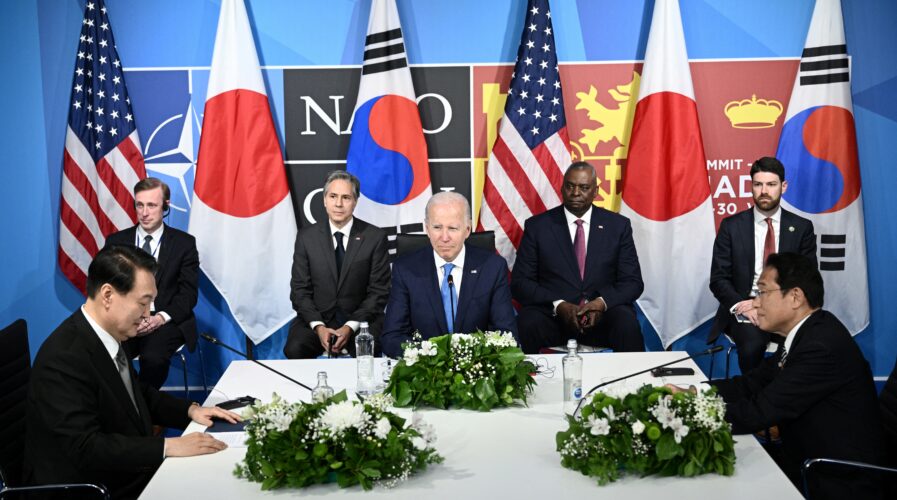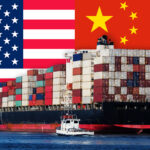
Chip 4 alliance: Will South Korea pick the US or remain an ally to China? (Photo by Brendan SMIALOWSKI / AFP)
Chip 4 alliance: Will South Korea pick the US or remain an ally to China?
- Proposed by the US in March, The Chip 4 is a strategic alliance of four global chip powerhouses that also includes South Korea, Japan and Taiwan.
- Aimed at countering Beijing’s growing influence in global supply chains, the US government has asked Seoul to respond to its invitation to join the chip alliance.
- The situation has caught South Korea between a rock and a hard place mainly due to its economic ties with China.
The exacerbating global semiconductor shortages over the last two years have made the United States (US) realize one thing — it has lost its shine in the industry and that there is a lot of catching up to do. Since then President Joe Biden has been taking various actions including touting a so-called Chips Alliance proposal to chip manufacturing powerhouses specifically in the Asia Pacific region. The alliance that would include South Korea, Japan, Taiwan, is above all, an apparent attempt by the US to counter China’s growing influence in global supply chains.
Frankly, the US has long attempted to corral Japan, South Korea and Taiwan with various attempts to build a US-led semiconductor supply chain alliance excluding China. However, the response has been slow from South Korea particularly despite the harder push from the US, as the former fears encountering significant pushback from its long time trading partner, China.
For context, the Chip 4, proposed by the US in March this year, is a strategic alliance of four global chip powerhouses that also includes Japan and Taiwan. The allies were picked based on its strength, whereby the US is a leading player in making the most advanced chips, while Japan takes the lead in supplying key materials and equipment. South Korea and Taiwan on the other hand, boast manufacturing prowess.
Overall, the alliance aims to reimagine supply chains of chips from production to distribution among friendly nations, considering how chips are increasingly being considered crucial security assets. Unlike Japan and Taiwan that seem willing to join the initiative, however, South Korea, home to Samsung Electronics and SK hynix, the world’s top two memory chip makers, has yet to decide its stance.
What is taking South Korea so long to respond to the US?
For starters, the US and South Korea do not see eye to eye on the best way to manage China’s growing economic, military, and diplomatic power. The gap only became increasingly apparent as the US began engaging its allies and partners to address the challenges posed by Beijing’s agenda while Seoul strategically avoided taking sides. Historically, the US-South Korea alliance has been focused on staving off threats from North Korea, but lately there has been a growing desire among US policymakers to collaborate with Seoul as part of the US-China conflict.
Even during Biden’s recent summit trip to South Korea, he made his first stop at a Samsung Electronics plant with the newly inaugurated South Korean President Yoon Suk-yeol. There, via a joint statement, Biden had outlined several areas of bilateral cooperation for addressing supply chain vulnerabilities in critical technologies. Prior to that, he had even named semiconductors as one of the four critical products to US security and called for “friend-shoring” where production of those goods are brought back to the US and its like-minded allies.
Seoul’s Foreign Ministry spokesperson Choi Young-sam said in a press briefing last week, “We have continued talks with the US to bolster ties on chips but nothing has been decided yet,” he said, while referring to the US-led chip alliance as a “global partnership” instead of addressing it as “Chip 4.” But the lukewarm approach reflects Seoul’s tricky position between the US, its key security ally, and China, its biggest trading partner.
For context, when it comes to chips, the key export item of South Korea, China makes up almost close to half of the total exports. Last year alone, South Korea’s memory chip exports totaled US$69 billion and 48% of the exports went to China. That, experts reckon, is why the South Korean government is hesitating to give a definite answer to the US government.
Even should China begin to lose trust in the South Korean supply chain in the industry, the latter’s semiconductor suppliers’ Chinese market share will inevitably take an immediate hit. As it is, China has criticized Chips 4 as “coercive diplomacy” and warned that South Korea would “cause more harm than good” by taking part.
While details about the new quadrilateral framework are scant, full realization of technological alliance between the US and South Korea will likely involve wholly detaching China from the global semiconductor manufacturing process and a significant reduction of semiconductor sales to the mainland. To date, Japan and Taiwan have said yes, and should South Korea join the Chip 4 by the US, the country would most definitely open itself up to economic retaliation from China.
READ MORE
- Safer Automation: How Sophic and Firmus Succeeded in Malaysia with MDEC’s Support
- Privilege granted, not gained: Intelligent authorization for enhanced infrastructure productivity
- Low-Code produces the Proof-of-Possibilities
- New Wearables Enable Staff to Work Faster and Safer
- Experts weigh in on Oracle’s departure from adland


